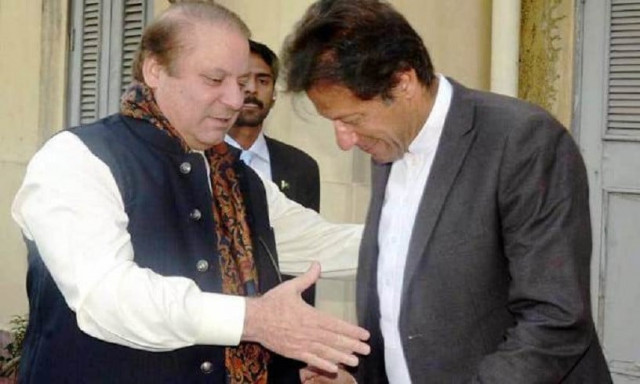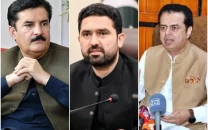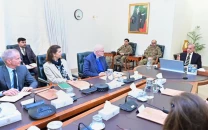Following in Imran, the narratologist’s footsteps
Nawaz is now embracing Imran-style speeches

Seated in a closed room and flanked by Pakistan’s flag on the right and party flag on the left, the speakers engage the nation. With a microphone affixed near the chest and papers placed on the table, they resort to a well-rehearsed script – blaming rivals, lamenting past governance, expressing regret for public suffering and passionately pitching a return to power.
This political theatrics feels familiar. Former premier Imran Khan perfected the art, and now, a leading contender for the next PM, Nawaz Sharif, has adopted the same: preferring to address the nation from a controlled setting instead of rallying in extremes.
Previously, only the prime ministers or the president used to address the nation via national television but the trend has changed in the recent past.
Now, the bigwigs of the political parties use social media platforms to address people but label it as an address to the nation. One example of this was when Nawaz delivered his address to the nation the other day emulating what Imran used to do through social media.
Read Pakistan’s political twister
“This is the age of Imran Khan,” renowned political expert, Zaigham Khan said, saying “Imran Khan is the trendsetter of the 21st century while others follow his footsteps.” On the new trend of addressing the nation when one is actually addressing his party workers and supporters, the expert noted that Imran had started the trend after he was ousted from power but “Nawaz has followed suit now.”
Earlier, Zaigham recalled that only the head of the state or the prime minister would address the nation through state television but social media has changed the trajectory of politics and political narrative, adding that leaders like Imran, Nawaz and others do not hold the top positions right now but they communicate with authority and aura via social media.
The only difference, he noted, is that Imran is the trendsetter while others have simply been copying his ideas and expecting similar results. In the age of new media which gives wings to narrative, Zaigham said that Imran has been using social media as a leverage to spread his narrative. “Imran Khan is the narratologist; he makes his narrative fly on social media” while other parties have no understanding of how he frames things, saying they just start doing what Imran does as far as spreading the message via social media is concerned.
Read PTI promises political resurgence ahead
However, Zaigham recalled, Pakistan Peoples Party was the trendsetter before PTI, noting that it was Zulfikar Ali Bhutto’s train journey from Rawalpindi to Lahore and the welcome that he received that really gave birth to PPP.
So, he added, the train march that other parties opted for later on was started by Bhutto, regretting that political parties were less open to fresh ideas.
“Earlier, political parties would organize rallies at Mochi Darwaza, Nasir Bagh or Liaquat Bagh but much is happening in the virtual space these days,” Professor Tahir Naeem Malik of NUML University said, adding “Political activities were mainly being managed through social media these days.”
Admitting that Imran Khan is the trendsetter today as his interaction is wider ranging from YouTubers to lawyers and from political bigwigs to the general public, the professor said that it was Bhutto who would meet university students, writers, farmers, trade unionists and the general public, saying political leaders do such kind of politics to stay connected with people.
“Other parties’ leaders do not even meet general people for weeks and months,” he noted. As opposed to Imran and Bhutto, Professor Malik said that Nawaz Sharif has only addressed a gathering in Lahore upon his arrival and he has since preferred to have “drawing room interaction” or interaction with people via virtual space.
Read ‘Nawaz’s return poised to shift political landscape’
He noted that Nawaz went to Quetta but stayed in a five-star hotel and the little interaction he had with people was after barring media from attending it.
“PML-N was a drawing party and going back to drawing room politics is natural for it,” Professor Malik said. When asked about the closed-room address to the nation and whether it was due to security concerns, Malik didn’t fully agree and said that Nawaz and several others do not face the kind of threats that the Awami National Party and ex-premier Benazir Bhutto faced.
He concluded by saying that drawing room politics is no substitute for street politics, saying only Nawaz made PML-N somewhat an "awami party" as many others neither have much public appeal nor seem comfortable in reaching out to the masses.



















COMMENTS
Comments are moderated and generally will be posted if they are on-topic and not abusive.
For more information, please see our Comments FAQ